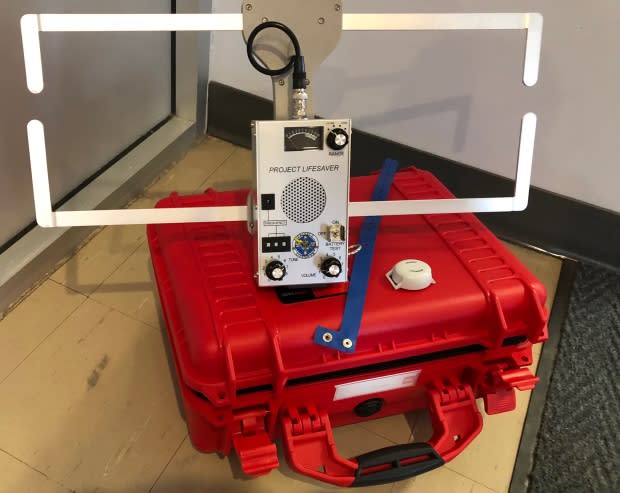How a new bracelet can help searchers find lost dementia patients
A search and rescue group in the Fredericton area has adopted a new program to help track down people who have cognitive disabilities if they wander off and get lost.
"Primarily we're focusing on those who have Alzheimer's, dementia, autism, or traumatic brain injuries — anyone who might be more prone to wandering away or not having the cognitive ability perhaps to find their own way back if they were to become lost," said Eric Ferguson, chair of York Sunbury Search and Rescue .
Project Lifesaver uses radio transmitter cuffs that can be worn on the wrist or ankle.
"Each of these transmitters will broadcast at an individual frequency and if one of these clients will go missing, we can come out with our specialized receivers tuned to that frequency and find them quickly," Ferguson said.

The electronic search specialists go out to the person's last known whereabouts, point their receivers and do a 360-degree sweep.
"And as I turn it closer toward the direction where you are, you can start to hear a loudening beep," he said.
The program is widely used in the United States, as well as in Nova Scotia and Prince Edward Island.
Caregiver needed
Ferguson said being pointed in the right direction is a huge help because a person who has a cognitive impairment may not behave the same way as a lost hiker or hunter.
"So in these categories, we find that the searches are often quite a bit longer ... and there's often a higher fatality rate, unfortunately," he said.
He urged people sign their loved ones up for the program.
"We love being able to bring people home quickly and safely to their loved ones," he said.
"I used to be a volunteer firefighter so I know a little bit about it. And it's awfully hard if you don't know what you're looking for." - Rick Hutchins of Autism Connections Fredericton
One of the main requirements for anyone wanting to join is that the person has to have a caregiver.
"It can't be someone who is kind of on the threshold but still living alone because they would have to be reported missing quickly," Ferguson said.
Cost and maintenance fee
The cuff costs $300, which is paid for by the family or caregiver.
Ferguson said Project Lifesaver recommends a maintenance fee, but York Sunbury Search and Rescue is doing its best not to charge one.
"We come out every 30 days to do maintenance on them. We take them off the client, clean them, make sure they're operating, and put them back on with a fresh bracelet and battery," he said.
The volunteer group holds fundraisers and has received a couple of grants and donations from companies and private donors.
Eight members of the search and rescue group received Project Lifesaver training last May.
Ferguson said they have three bracelets now but can order more.
Hope of expansion
He said they're only prepared to take clients in the York-Sunbury area, but he hopes the program will expand across the province.
The initiative is getting a good initial review from Autism Connections Fredericton.
"We think it's awesome and we've asked them to come in to present, at some point, to our families," said executive director Rick Hutchins.
"I used to be a volunteer firefighter so I know a little bit about it. And it's awfully hard if you don't know what you're looking for."
People who are signed up for Project Lifesaver are added to a database which searchers can tap into to get their cuff radio frequency and other personal details.

